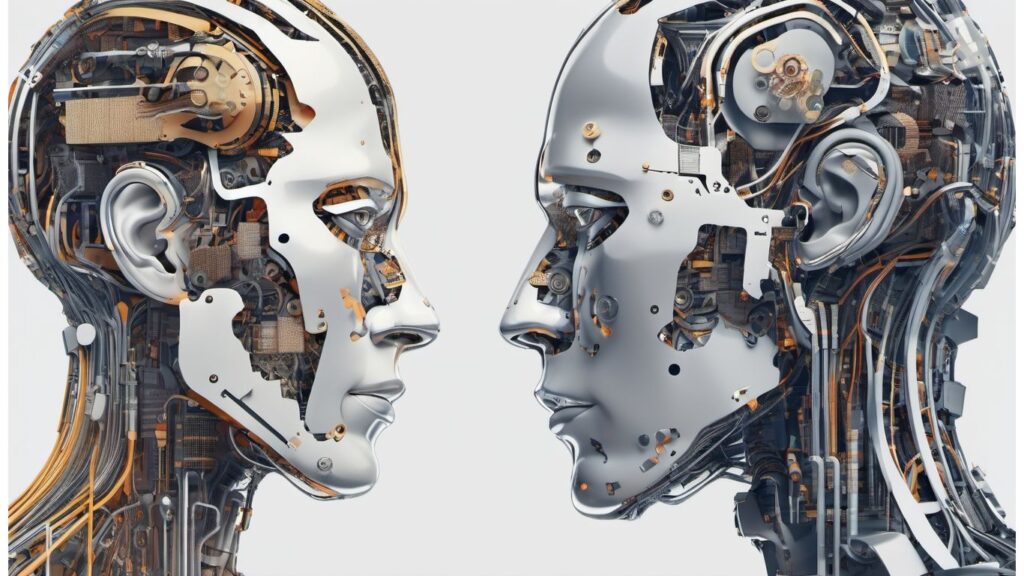Artificial Intelligence (AI) is transforming national security and defense strategies worldwide. From enhancing surveillance capabilities to fortifying cybersecurity, AI’s potential to revolutionize defense mechanisms is vast. This analysis explores the implementation and impact of AI in national security, showcasing real-world applications and addressing critical ethical considerations.
The Power of AI in National Security and Defense
Enhancing Surveillance and Intelligence Gathering

AI technologies are revolutionizing the way nations gather and analyze intelligence. One prominent example is Project Maven by the U.S. Department of Defense. This program leverages AI to analyze drone footage, significantly speeding up the identification and targeting of enemy combatants. By automating the analysis process, AI allows for quicker and more accurate decision-making, enhancing operational efficiency and effectiveness.
Strengthening Cybersecurity
AI’s ability to detect patterns and anomalies makes it a powerful tool in cybersecurity. Israel’s military, for instance, uses AI-driven predictive analytics to anticipate and counter cyber threats. This proactive approach has improved the nation’s ability to defend against cyber-attacks, ensuring the integrity of critical infrastructure and sensitive data.
Advanced Defense Systems
Nations are also integrating AI into their defense systems to gain a strategic edge. For example, Russia’s “Zaslon” software uses AI to monitor and protect the country’s nuclear arsenal by detecting potential cyber threats. Similarly, China’s AI-powered early warning radar system can identify stealth aircraft, bolstering its air defense capabilities. These advancements highlight AI’s potential to enhance national security through sophisticated detection and defense mechanisms.
Case Studies
Project Maven (U.S.)
- Objective: Accelerate the identification and targeting of enemy combatants using AI.
- Impact: Improved accuracy and speed in analyzing drone footage, enhancing operational efficiency.
Zaslon Software (Russia)
- Objective: Monitor and protect nuclear weapons by detecting cyber threats.
- Impact: Increased security and reliability of Russia’s nuclear arsenal.
AI-Powered Early Warning Radar (China)
- Objective: Detect stealth aircraft and enhance air defense.
- Impact: Strengthened air defense capabilities through advanced AI technology.
Predictive Analytics in Cybersecurity (Israel)
- Objective: Anticipate and counter cyber threats using AI.
- Impact: Improved cybersecurity measures, protecting critical infrastructure and data.
Ethical Considerations in AI Implementation
While the benefits of AI in national security are transparent, ethical considerations must be addressed to ensure responsible use. Key areas of concern include:
Adherence to International Laws and Norms
AI applications in warfare must comply with international laws and human rights standards. Ensuring that AI-driven decisions adhere to these norms is crucial to maintaining global stability and ethical conduct.
Addressing Algorithmic Bias
AI algorithms can sometimes exhibit bias, leading to unfair or harmful outcomes. In national security, biased decision-making can have severe consequences. It is essential to develop and deploy AI systems that are transparent and accountable, minimizing the risk of biased outcomes.
Transparency and Accountability
AI-driven decisions in defense must be transparent and accountable. Precise oversight mechanisms are needed to ensure that AI applications are used responsibly and ethically, particularly in life-and-death situations.
Autonomous Weapons Systems

The use of AI in autonomous weapons systems raises significant ethical concerns. There is a risk of these systems being used to circumvent existing arms control measures, potentially leading to an arms race. International cooperation and dialogue are necessary to establish ethical frameworks for AI in defense.
Cybersecurity and AI Vulnerabilities
AI systems are not immune to cyber-attacks. Protecting AI applications from exploitation is vital to maintaining national security. Robust cybersecurity measures must be in place to safeguard AI-driven defense mechanisms.
Ethical Data Use
The data used to train AI models must be handled ethically, respecting privacy and consent. This is particularly important in surveillance and intelligence gathering, where personal data is often involved.
Impact on Employment
AI’s integration into national security and defense can impact employment within these sectors. It is crucial to consider workforce planning and support to ensure that employees are not adversely affected by AI deployment.
Promoting International Cooperation
International cooperation and dialogue are essential to avoid an AI arms race. Establishing common ethical frameworks for AI in national security can promote global stability and responsible AI use.
FAQs
What is the primary use of AI in national security?
The primary use of AI in national security includes enhancing surveillance capabilities, strengthening cybersecurity, and integrating advanced defense systems. AI technologies are employed to analyze large volumes of data rapidly, identify threats, and improve decision-making processes.

How does AI improve surveillance and intelligence gathering?
AI improves surveillance and intelligence gathering by automating the analysis of data from various sources, such as drone footage and satellite images. AI algorithms can quickly detect patterns and anomalies that might indicate potential threats, enabling faster and more effective responses.
What are the ethical considerations associated with AI in defense?
Ethical considerations include:
- Adherence to international laws.
- Addressing algorithmic bias.
- Ensuring transparency and accountability.
- Regulating autonomous weapons systems.
- Safeguarding AI systems from cyber-attacks.
- Ensuring ethical data use.
Additionally, the impact on employment and the importance of international cooperation are critical concerns.
Are there real-world examples of AI in national security?
Yes, notable examples include the U.S. Department of Defense’s Project Maven, Russia’s Zaslon software, China’s AI-powered early warning radar system, and Israel’s use of predictive analytics in cybersecurity. These projects highlight AI’s potential to enhance various aspects of national security.
How does AI address cybersecurity issues?
AI addresses cybersecurity issues by detecting patterns and anomalies that may indicate cyber threats. AI-driven predictive analytics can anticipate and counter cyber-attacks, thereby protecting critical infrastructure and sensitive data.
What are the risks of deploying autonomous weapons systems?
The risks of deploying autonomous weapons systems include the potential for circumventing arms control measures, leading to an arms race, and ethical concerns about machines making life-and-death decisions. Ensuring international cooperation and dialogue to establish ethical frameworks is essential.
How can AI impact employment in national security and defense sectors?
AI integration can lead to job displacement as automated systems take over tasks previously performed by humans. It is crucial to consider workforce planning and provide support for employees affected by AI deployment, ensuring a smooth transition and retaining valuable expertise within these sectors.
Why is international cooperation necessary in the context of AI in national security?
International cooperation is essential to prevent an AI arms race and promote global stability. Establishing common ethical frameworks and standards for the responsible use of AI in national security ensures that AI technologies are deployed in a manner that benefits all nations and maintains peace and security.
Conclusion
AI is revolutionizing national security and defense strategies, offering unprecedented capabilities in surveillance, cybersecurity, and advanced defense systems. However, the ethical implications of AI deployment must be carefully considered to ensure responsible and transparent use. By addressing these ethical challenges, policymakers, defense analysts, and technology experts can harness the power of AI to enhance national security while upholding global norms and human rights.











